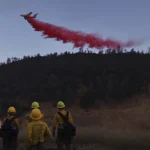UW Community Psychologist Addresses Human Trafficking, Violence Against Native Americans
Emily Grant shares what motivates her to improve the health of Wyoming communities
- Published In: Other News & Features
- Last Updated: Nov 11, 2022

By Jennifer Kocher
Special to the Wyoming Truth
As the last state to enact laws against human trafficking in 2013, Wyoming was slow to come to the table. But in recent years, the state has stepped up efforts to assess the scope of the problem, as well as address the escalating violence against Native American women and children.
Enter Emily Grant.
Grant, 39, is a community psychologist and lead researcher at the Wyoming Survey and Analysis Center at the University of Wyoming. Her research has been instrumental in advancing the conversation on human trafficking and Missing and Murdered Indigenous People (MMIP). As a member of the state’s anti-trafficking task force, Grant has spearheaded research to address the underlying issues and their impact on the state.

Grant received her doctorate from Wichita State University and moved to Wyoming in 2011 for post-doctoral work at UW. She has researched a myriad of social issues, from veteran peer support groups to community-based youth substance abuse prevention programs, among others.
The Wyoming Truth spoke with Grant about her work and what motivates her to strengthen the health of communities statewide. What follows are excerpts from the interview.
What is a community psychologist?
Grant: Unlike psychology, which works with an individual one-on-one to overcome problems, community psychology focuses on building healthy communities, so individuals can thrive. Community psychology recognizes that people do not exist in a vacuum and where you live matters. It’s hard to thrive if your environment does not meet your needs. This could be things like access to healthy foods, education, employment, policies, and practices to keep people safe, positive role models and healthy social norms.
How long have you been doing this work, and what are some of the research projects you’ve conducted?
Grant: I have been working as a community psychologist for more than 15 years. I started in Kansas working on community mental health and peer support for mental health care, including veteran-to-veteran support. When I came to Wyoming to do my postdoc in 2011, I began working on community-based youth substance abuse prevention in Wyoming, Oregon and North Dakota. I enjoyed those projects, because I got to visit each county and tribe and learn about the communities—what they were facing and how they hoped to solve the issues.
Around 2012-2013, I did some of the first research on human trafficking in Wyoming. The study aimed to both quantify the prevalence and learn about people’s perceptions of human trafficking. I looked at law enforcement data and traveled around the state to talk with social service providers, law enforcement, truck station employees, hospitality workers and gentlemen’s club workers to get a pulse of what they were seeing. Around the same time, Wyoming passed anti-trafficking legislation and formed an anti-trafficking task force. I am active on that task force… In 2019, when a UW student group named Keepers of the Fire held an awareness-raising event for Missing and Murdered Indigenous Women, the governor was called upon to create a task force to begin addressing the issue…The first order of business was to collect information to determine the scope of the problem…The issue is close to my heart, so I was honored to use my skills to work on this project and be the lead researcher.
How has your research impacted policies or initiatives in Wyoming?
Grant: My research has evaluated the quality of substance abuse programming so that those who implement the programming can make adjustments to best serve the community in which they work. My research has provided valuable information to policymakers, so they can make data-informed decisions to create local policies in schools and businesses, or their cities, or states.
For example, the research on human trafficking and Missing and Murdered Indigenous Persons has informed the governor’s task forces on these topics. The task force uses the information to make informed decisions on things like what type of training is needed and which policies or statutes could be strengthened. Another example is facilitating a diverse group of stakeholders from around Wyoming to develop an implementation plan for the federal Violence Against Women Act funding [The 2022 Act authorized an annual appropriation $25 million combined for both the grants and reimbursements for Tribal governments.] I gathered data and presented it to the group and led them through the process of understanding the data in the context of the state and determining improvements that they would like to make to better serve victims of domestic violence and sexual assault in Wyoming. Some of the examples were increasing community connections so that programs could work together and increasing access to language services to assist victims.
What draws you to your work on human trafficking and Missing and Murdered Indigenous People?
Grant: These are very important topics that really have a lot of intersections. Exploitation of people and disregarding their humanity is nothing new. But I am very glad that it is getting more attention now and that people, communities and governments are willing to stand up and make a change. I believe it impacts us all, really. We cannot have healthy communities when community members have their vulnerabilities exploited, especially for someone else’s gain. We cannot have healthy communities when community members are missing, and no one goes looking when they are murdered, and there is no justice. These are issues that impact me personally, but these are not stories that I share publicly.
What could the state do policy-wise to help mitigate the problem of Missing and Murdered Indigenous People?
Grant: We need to strengthen both our protocols and data systems related to MMIP. Adoption of protocols recognized as best practice will help law enforcement carry out investigations in a systematic way and will help families know where the investigation stands. This is important, especially when there are multiple jurisdictions involved in the case. Enhancing data systems is critical. We need to be able to accurately document tribal affiliation in official records, law enforcement reports, coroner’s reports and vital records. Sometimes that might require an extra step of confirming with family or cross-referencing other documentation, but accuracy is essential…We need to have an Indigenous advocacy position or response team to help families navigate the reporting and investigation process from beginning to end. The advocate could help interface between the family and law enforcement, as well as connect the family to the resources they need. We need to raise community awareness by educating the public. People need to understand that this is something that is happening in Wyoming and across North America. People who work to design programs at the community or state levels need to know the risk and protective factors so that their programs can address those. The public also needs to know what resources are available in the community if they need help.













